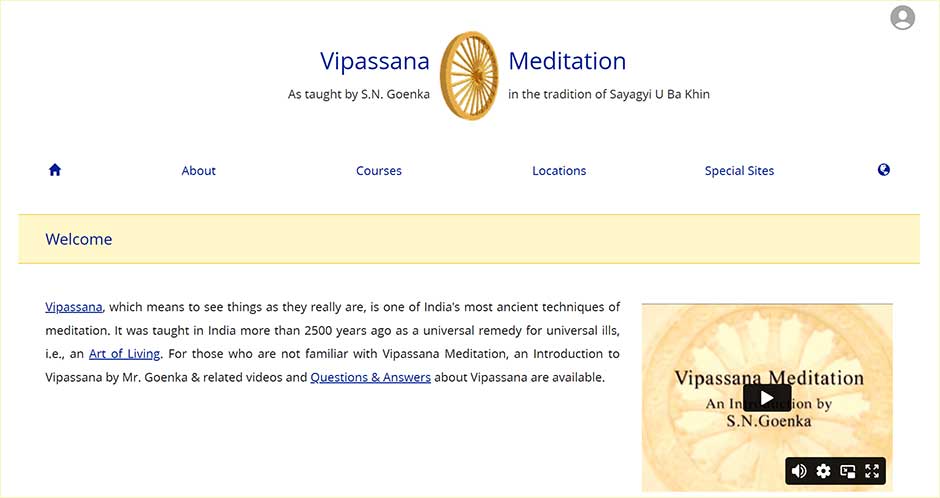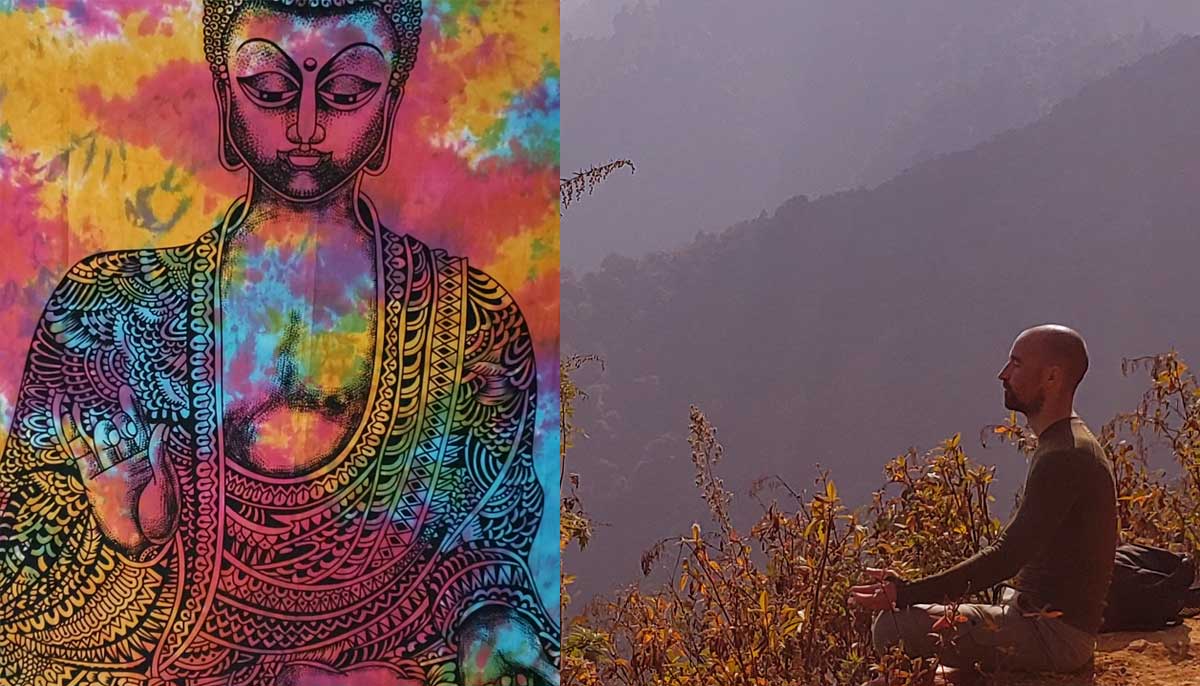Vipassana, Buddhism and Meditation: A Look into the Journey of Peace and Mindfulness
Last Updated: January 02, 2025
TweetVipassana is a classic Buddhist meditation that focuses on self-observation and introspection. It began about 2,500 years ago with the teachings of Siddhartha Gautam, often known as the Buddha. It is based on the Pali term “vipassana, " meaning “to see things as they are”. Vipassana meditation seeks to attain insight into the underlying nature of reality while also increasing awareness and comprehension of the mind and body.
Vipassana is a practice of self-transformation via self-observation. It emphasizes the profound connectivity between mind and body, which may be immediately experienced by paying focused attention to the bodily sensations that constitute the life of the body and continually link and condition the life of the mind. This observation-based, self-exploratory journey to the shared root of mind and body minimizes mental impurities, culminating in a healthy mind full of love and compassion. Self-discovery practitioners typically face deep psychological challenges as they struggle with deeply rooted thinking and behavior patterns. But it is because of these difficulties that real transformation takes place, resulting in profound realizations and enduring tranquility.
Buddhism serves as the abstract basis for Vipassana meditation, giving a comprehensive framework for understanding the essence of life. The Four Noble Truths derived from the teachings of Siddhartha Gautam: “the reality of suffering, the reality of its conclusion, and the truth of the path that leads there” are the focal facts of Buddhism. Buddhist approaches such as meditation, ethical behavior, and wisdom cultivation provide a comprehensive framework for human change and escape from cyclic life.
Vipassana overcomes religious and cultural barriers, providing a global route to inner calm and release. While strongly steeped in Buddhist tradition, its ideas appeal to seekers from many areas of life because of its simplicity and efficiency in reducing suffering. Vipassana meditation often begins with concentrating the attention on the breath to create concentration. Following a certain point of stability, practitioners focus on observing the emergence and passing of bodily, mental, and emotional sensations. Through this practice, mindfulness and insight into the fleeting, selfless nature of all phenomena can be developed. With consistent practice, people may enhance their mental acuity, emotional stability, and understanding of both themselves and the outside world.
Meditation holds a pivotal role within Buddhism, serving as a cornerstone practice aimed at nurturing mindfulness, concentration, and profound insight. This ancient tradition employs diverse methodologies such as mindfulness meditation, which encourages a heightened awareness of the present moment; loving-kindness meditation, fostering compassion and goodwill towards oneself and others; and Vipassana meditation, facilitating deep introspection and clarity of mind. These different forms of meditation are skillfully utilized within Buddhist teachings to foster mental clarity and emotional balance, ultimately guiding practitioners toward a greater understanding of themselves and the world around them.
Meditation, Buddhism, and vipassana are combined on a path of self-discovery and freedom. A life of fullness and significance by practicing mindful awareness, helps people develop inner peace, knowledge, and compassion. The ageless teachings of Vipassana continue to illuminate the way towards mindfulness and calm, providing comfort to those who seek it in a world that is ravenous for authenticity and connection.
Please click here to get the complete details on available programs, volunteer’s roles and activities , accommodation, cost, visa , vaccination, airport arrival and the rest of it.
Get More Info Now »
Vipassana Meditation Benefits:

Vipassana mediation offers a variety of advantages, including both mental and bodily advancements, much like the majority of other meditation techniques. Vipassana meditation has the following benefits:
Developing mental clarity and serenity:
Engaging in Vipassana meditation fosters the cultivation of a serene and focused mindset. Practicing mindfulness aids in alleviating stress and anxiety, while also enhancing one’s outlook on their present circumstances.
Becoming more mindful of the present moment:
Vipassana meditation aims to enhance practitioners’ mindfulness of the current moment. Engaging in this practice enables individuals to diminish their instinctive responses to thoughts and feelings, thereby preventing them from becoming entangled in constant rumination about the past or future.
Improving one’s physical well-being:
Research shows that individuals who participate in Vipassana retreats repeatedly come back with improved physical well-being. While the precise reasons behind this phenomenon remain uncertain, specialists suggest that the reduction in stress levels may be the preliminary contributing element.
Reducing negative emotions:
The Vipassana meditation method is effective in diminishing adverse feelings like anger, animosity, and avarice. Through this practice, individuals learn to attentively observe these emotions rather than succumbing to them, fostering a state of heightened awareness and inner calmness.
Enhancing judgment:
Practicing Vipassana meditation cultivates a serene mental state, which enhances mindfulness, self-regulation, and inner tranquility. Stretching these aspects enables one to make more informed decisions guided by reality than external pressures.
The combination of Vipassana meditation, Buddhist philosophy, and mindfulness techniques presents a profound pathway toward profound personal growth, enlightenment, and liberation from the shackles of suffering. Through the deliberate cultivation of mindfulness and the nurturing of insight, individuals embark on a transformative journey that leads them toward inner peace, heightened wisdom, and a profound understanding of themselves and the world around them.
By embracing the fundamental principles of Buddhism and integrating them into their daily lives, individuals equip themselves with the tools needed to navigate life’s inevitable challenges with grace, resilience, and a clear mind. However, this journey transcends mere self-improvement; it is equally about fostering compassion, empathy, and a deep sense of interconnectedness with others and the global community. Ultimately, the aim is not just personal tranquility but also to contribute positively to the collective well-being and harmony of the world.
We hope this was helpful to you
In conclusion, combining mindfulness exercises, Buddhist philosophy, and Vipassana meditation gives a comprehensive path to enlightenment, inner peace, and liberation from suffering. Through developing insight, integrating Buddhist precepts, and cultivating mindfulness, this journey equips people to face life’s challenges with fortitude, compassion, and mental clarity. It highlights the need to develop compassion and actively promote the welfare of others as well as society at large, in addition to stressing personal tranquility.
By using this all-encompassing method, practitioners set out on a life-changing path that improves their quality of life and fosters global oneness and connectivity. Thus, the study of Vipassana, Buddhism, and meditation is a light that points people in the direction of a happy life filled with serenity, awareness, and meaningful interaction with the outside world.
Please click here to get the complete details on available programs, volunteer’s roles and activities , accommodation, cost, visa , vaccination, airport arrival and the rest of it.
Get More Info Now »




